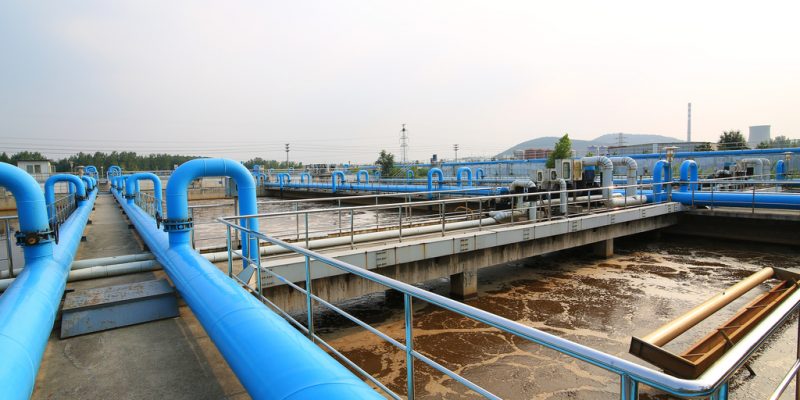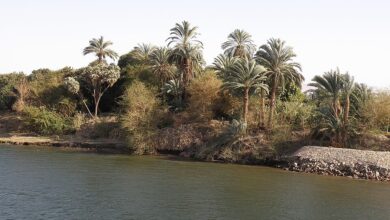Leaked sewage and human error likely caused over 1,500 residents in the village of Sansaft in Monufiya governorate to fall critically ill this summer, two researchers at Monufiya University said this week at a follow-up meeting on the issue.
Staff turnover at a drinking-water company resulted in chlorine treatment halting for about a month in August in Sansaft, and at around the same time sewer waste almost certainly seeped into the water distribution network, the researchers said.
Tests carried out in two Ministry of Health labs and a private lab found high levels of iron and manganese in the water, according to Kamal Dahab and Mohamed Fathy Salem, professors at Monufiya University. While iron and manganese generally do not cause illness, they can affect water’s look and taste, and bacteria and organic waste from sewage can lead to liver disease and other ailments.
A Health Ministry committee said in a report that the lack of chlorine in the water led to Salmonella contamination, MENA reported last month.
Tests showed iron present in Sansaft’s water at a rate more than eight times the normal rate for drinking water, with manganese 18 times the internationally accepted rate and nearly twice the standard in Egypt, according to Dahab. Tests of Sansaft water also showed high levels of “hardness,” a quality of water that affects how it interacts wietth soap and detergent; heavy metals were not a problem, Dahab says.
Drinking water in the Delta comes from both groundwater and surface water, but in Sansaft, groundwater made up the majority of the water supply, Dahab says.
The town has now switched to surface water in what Dahab called a long-term solution as plans for better filtration systems come to fruition and the water-distribution system is rapidly cleaned and brought up to speed.
Representatives from the Health Ministry, Monufiya University, and the local drinking-water company gathered Monday at the Monufiya University faculty club to discuss water contamination in Monufiya, with an eye to potential long-term solutions and how the university could play a role in improving the situation.
Asem Ali Atia, a professor of applied surface chemistry at Monufiya University, advocated during a presentation for reverse osmosis, a filtration system that uses pressure to remove unwanted particles from water, as well as more effective chemical treatment of Delta drinking water. In Egypt, chlorine injection generally serves as the sole method of treating water.
Regular cleaning of pipes and competent human oversight of such filtration methods are essential, while punishing factories for unregulated waste disposal would go far to prevent contamination, he added.
Kamal Dahab, a professor of water science at Monufiya University who also presented at the workshop, said Egypt poorly managed its water resources as a whole. He says a significant percentage of water, particularly from the Nile River, goes to waste, while areas like Monufiya suffer from frequent contamination.
Groundwater in the Delta often displays high levels of iron and manganese, as well as both inorganic and organic pollution from agricultural activity, residential areas, factories, and the sewage system.
“Surface water gets pollutants mainly due to human activities and uncontrolled sewage disposal,” Atia said during his presentation.
Researchers have long warned of the water crisis in Monufiya, Salem says, but government officials have continuously failed to act –– even after Health Ministry workers came to hear Monufiya residents’ concerns five months ago.
“The government didn’t care or get in their minds that there would be a true crisis like this,” says Salem, an assistant professor of agriculture at Monufiya University who organized Monday’s workshop.
Officials from the Health Ministry and Ministry of Housing, Utilities, and Urban Development were unavailable for comment on the Monufiya issue, however authorities have allegedly moved to hold employees of the drinking company’s water station accountable.
The head of the water station in Sansaft and five of his aides were being held in custody on charges of neglect, failing to perform their duties, and pumping drinking water into the water network without purifying it, according to the report from MENA last month.
Their trial has twice been postponed, with the next court date reportedly set for 29 November.
Still, the professors decried the government’s failure to direct resources toward the Delta and inability to implement any effective long-term water policy.
For the time being, Salem says he continues to stick to bottled water.
But at a price of LE500 to LE600 per month for his family, that option remains far out of reach for the average Egyptian family, leaving concerns about access to clean water in the future to continue plague the people of Monufiya.




